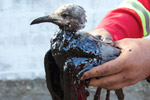One of the world’s largest oil and gas companies, Total, has committed to leave the planet’s UNESCO World Heritage Sites untouched, according to the United Nations. The UN says the French energy giant has sent written confirmation that it will not explore or extract fossil fuels from any of the world’s over 200 natural World Heritage Sites.
“Total’s commitment clearly shows that operating in World Heritage sites is not an option for responsible extractive industries,” Julia Marton-Lefèvre, the director general of the International Union for Conservation of Nature (IUCN). “It gives us hope that the oil and gas, and mining sectors as a whole will fully embrace their shared responsibility towards the conservation of our planet’s most valuable and irreplaceable places.”
As easily accessible fossil fuel reserves run out, more and more companies are pursuing new reserves in formally protected areas, including World Heritage Sites. For example, Soco International is currently undertaking seismic testing in Virunga National Park in the Democratic Republic of the Congo, while Pluspetrol is conducting exploration in an indigenous reserve that serves as a buffer zone to Manu National Park in Peru. Both Virunga and Manu are World Heritage Sites. In fact, data from 2011 found that a quarter of Africa’s World Heritage Sites were threatened by oil, gas, or mining projects.
Such exploitation can have impacts on World Heritage status. In 2007, the UN revoked World Heritage Status from Oman’s Arabian Oryx Sanctuary after the country reduced the park by 90 percent in order to extract oil.
While Total has committed not to operate inside World Heritage Sites, it is currently operating just outside the border of Virunga National Park.
“We call on all extractive companies, and the governments who regulate them, to declare World Heritage sites as ‘no-go’ zones,” adds Marton-Lefèvre.

Baby mountain gorilla in Virunga National Park. Virunga is home to one of only two populations of mountains gorillas in the world. Photo by: Cai Tjeenk Willink/Creative Commons 3.0.
Related articles
Shell drops plans to drill in the Arctic for now
(01/30/2014) Facing plunging profits, Royal Dutch Shell has announced it will cut exploration and development funding by nearly $10 billion this year, including halting their long-suffering plans to drill in the Arctic ocean. Shell’s new CEO, Ben van Beurden, made the announcement yesterday that controversial plans to drill off the Alaskan coast will be put on hold for another year.
A series of oil spills sully Caribbean paradise, coating mangroves and wildlife (photos)

(01/29/2014) On December 17th, officials first discovered a massive oil spill in the Caribbean-island nation of Trinidad and Tobago. Since then, a series of oil spills have been discovered, coating beaches, sullying mangrove forests, and very likely decimating wildlife in Trinidad’s Gulf of Paria. The oil spills have been linked to the state-owned oil company, Petrotrin, which has claimed that sabotage is behind at least two of the spills. However Trinidad and Tobago’s Environmental Management Authority has recently slapped the company with a $3.1 million fine by for the damage, while some politicians have called for an independent investigation into the slew of spills.
High-living frogs hurt by remote oil roads in the Amazon

(01/14/2014) Often touted as low-impact, remote oil roads in the Amazon are, in fact, having a large impact on frogs living in flowers in the upper canopy, according to a new paper published in PLOS ONE. In Ecuador’s Yasuni National Park, massive bromeliads grow on tall tropical trees high in the canopy and may contain up to four liters of standing water. Lounging inside this micro-pools, researchers find a wide diversity of life, including various species of frogs. However, despite these frogs living as high as 50 meters above the forest floor, a new study finds that proximity to oil roads actually decreases the populations of high-living frogs.
World first: Russia begins pumping oil from Arctic seabed
(12/23/2013) Oil has begun to be pumped from the Arctic seabed, according to Russian oil giant, Gazprom. The company announced on Friday that it has begun exploiting oil reserves at the offshore field of Prirazlomnoye. The project, which is several years behind schedule, is hugely controversial and made international headlines in September after Russian military arrested 28 Greenpeace activists protesting the operation along with a British journalist and Russian videographer.
Indigenous groups win right to pursue Chevron assets in Canada in Amazon pollution case
(12/19/2013) Indigenous plaintiffs in a long-running legal dispute against Chevron won the right to pursue the oil giant’s assets in Canada as part of a $9.5 billion judgement by an Ecuadorean court over damages in the Amazon, reports Amazon Watch.







